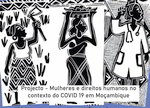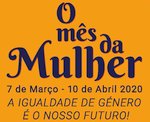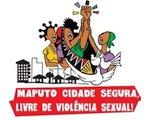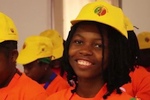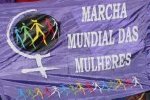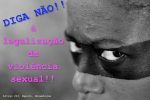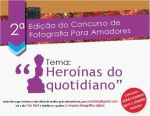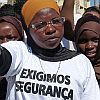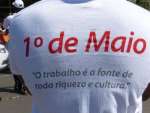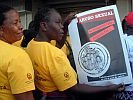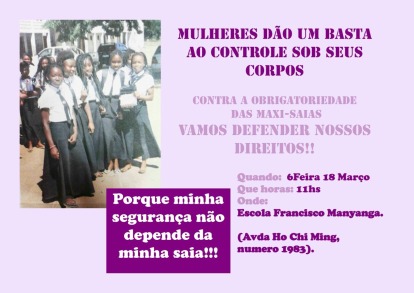Who’s afraid of children’s rights?
Police repression against street action that was pushing for an end to violence against school girls.
For Portuguese version, click here
Civil society organizations tried to organize a street action, with theatrical activity and reading from a press release, to demonstrate against the increase in violence against girls at school, as well as against the rules in which schools intend to control the garments of students, placing on them the blame for the sexual assault they suffer from teachers and classmates.
In contempt of all rights, the police repressed this action, which did not happen, holding five of the activists, using force, intimidation by arms and confiscation of materials such as posters, mobile phones and cameras.
Civil society calls for accounts of this illegal action from the police, who claimed to be serving “Superior Orders”.
Background
A group of civil society organizations, under the coordination of Fórum Mulher (Women’s Forum), issued, on March 17, a press release about the rights of women and girls in education referring to several examples of violations of those rights, in particular: ruling no. 39 from the Ministry of Education and Human Development, which forces the pregnant students to be compulsively transferred to the school, the insulting and degrading corporal punishment imposed on girls for some teachers, the increase in sexual harassment, the mass allocation of adolescents of both sexes to night classes allegedly for lack of slots, with a consequent withdrawal, and the control of girls’ clothing.
The civil society initiative was motivated by the information disclosed in the press (newspapers and television), about schools that force girls to wear long skirts to the ankle, as part of the school uniform.
Thus, on 18 March, a street intervention was scheduled and disclosed through a press release statement and a poster that circulated among activists and by social media (email, Facebook, WhatsApp). The idea was to read the press release at the time of the action and then present a play, performed by a group of girls, activists and actresses, who are high school students. This theatrical play had as subject violence against girls in school and was designed by a group of girls, who wanted to talk about the problems they face on a daily basis.
This action had the participation of a Brazilian Theatre Group of civil society, who was in Mozambique, invited by two Mozambican organizations, Blue Horizon and the Feminist Movement of Mozambique (MOVFEM). Their presence in the city of Maputo followed a visit to several provinces of the country where they interacted with other young students collectives.
For the activity were prepared posters with the following slogans:
- “I do not dress for you”;
- “My skirt doesn’t make me an angel or a whore”;
- “My skirt isn’t an invitation”;
- “Take control of your penis”;
- “What about the miniskirts of babies and old ladies raped?”;
- “Government: when are you going to put a stop to sexual violations?”;
- “Your lack of control it is none of my business”.
These messages were intended to emphasize the brutal and sexist practices of violence against girls, which are seen as “normal” in many schools in the country. It was intended for the material to be provocative, so as to encourage and promote the debate. The feeling that one has is that these issues are often ignored and it is, therefore, necessary to force people to think about the topic and take a stand to fight once and for all these situations that keep girls out of school.
The site chosen for the street intervention was in the vicinity of the School Francisco Manyanga, as it is a leading school that influences others in town.
Municipal authorities were not informed about this activity, since it was a small-scale action, to be performed on a sidewalk, but without disrupting the normal movement of people and vehicles. It should be noted that the organizations involved have an extensive experience of public demonstrations and did not believe that this action, in particular for its small size, could represent a risk to public order and demanded prior information to Maputo City Council.
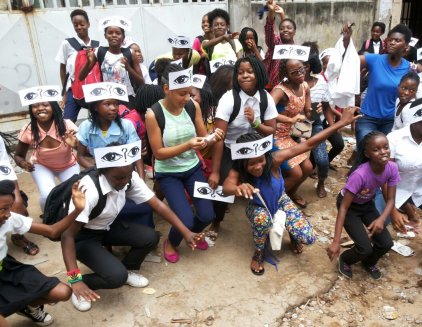
The events of the day 18 March
The action was scheduled for 11 a.m, but by 10:30 people began to gather on the sidewalk in front of the school, with police already in the area, both in uniform and undercover, men and women.
The action could not be performed as planned due to the intervention of the police, who prevented by force the performance. The events ensued in the following order:
- Around 10.50 a.m. one of the activists arrived at the scene and distributed the posters that were in their car; the posters were not even exposed but placed on the sidewalk, waiting for the start;
- At that moment the police decided to act immediately and confiscated the posters, claiming lack of permission to hold them and stating that to recover it they should go to the police station (7a Esquadra);
- Campaigners questioned that decision, but chose to continue with the activity without the posters, which were not a key component;
- Then the police began to insist on knowing who were the organizers of the activity, screaming, because they wanted to take them to the police station. As the response did not satisfy them, because they were told it was a concerted action by a collective of various organizations and people, the police officers started to grab the white activists who were present and dragged them. They ignored the other activists who were present and where the majority;
- When the activists agreed that the posters were taken away by the police officers, the police action slowed down a bit. At this time the group went a step further on the sidewalk and the adolescent and young girls began singing and dancing, chanting: “when women come together, the Patriarchate will fall, when girls ate united, machismo will fall, when women come together, the violence will fall, will fall, will fall…”;
- This song triggered a rapid response of the police officers, which sought their guns in the cars and, armed, approached the group of girls. These began to flee, terrified, dispersing across the road in a reckless and dangerous manner;
- Before this “attack” from the police, a group of activists confronted them, questioning the reason for this behavior and alerting to the dangerous consequences, because the girls fled onto the streets out of control and full of fear, risking being victims of hit-and-runs;
- Other activists were taking pictures and filming for later denunciation of the police violence;
- It was at this time that the police officers proceeded to the arrest five of the activists who most questioned them or were taking pictures and filming, trying to remove cell phones and confiscating the machines; the activists were handcuffed;
- At the time they were being taken to the Police Station, war tanks and cars with police dogs were also arriving at the scene.
As televisões STV e Miramar encontravam-se presentes e filmaram os acontecimentos. A principal pergunta para as activistas presentes foi saber se tinham autorização, se tinham falado com o director da escola e se este estava informado. Em nenhum momento perguntaram o porquê, nem procuraram conhecer o conteúdo do comunicado.
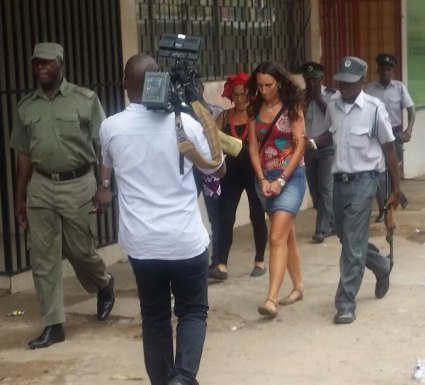
The events at the police station
The five activists arrived, around 11:20 a.m., at the police station (7a Esquadra), where they were held until around 5:30 p.m.
At the station, having been identified, the police took their earrings, bracelets, watches, mobile phones and the laces of their shoes and put them in a cell. The officer who delivered them to the on-call officer reported that two activists of white race were the leaders, while a third was the agitator, and the rest were listed as having captured unauthorized images.
The cell later came to remove the 2 activists of white race, by claiming that they had to talk to the press. Faced with the refusal of one of them, the police tried to force her verbally, but without success. Then another activist was brought in, who spoke to the press.
Then the activists were put back in the cell and took the other two who stayed behind at first. With these two the police attempted a divisive tactic, questioning them why they “followed” the White Westerners who did not know nor defended “our culture”. These two activists were taken back into the cell about an hour later after questioning.
In the meantime other activists gathered outside the police station and reported the situation to various people and institutions. Police officers on duty told them that their colleagues wouldn’t be released that day, because there were “superior orders”.
Alice Mabota, President of the League for Human Rights, went to the police station (7a esquadra), where she was informed of the situation and mediated the discussions. She was told that those detained would be released immediately after identification, and she left. None of this ever happened.
The Prosecutor of the City of Maputo also made way to the station and spoke with the detained in the cell. Not having found any auto made by police, she ordered that they be freed and were taken to an office room at the station.
At this point, it was clear that if the crime was that of illegal demonstration (which was doubtful since it was the presentation of a play), then the procedure was simply registration of identification. The Commander of the police station refused categorically to release the detained. In fact, repeated numerous times that no one was arrested, but that they should be questioned.
Throughout the discussion that followed, the commitment of another crime was brought up, in this case that of indecent exposure due the content of the posters, which had words like vagina and penis.
It was further claimed that the inmates used violence against the police and said insults.
Throughout the time that the five activists remained detained, the behavior of the Commander of the police station (7a esquadra) was characterized by an overbearing and authoritarian manner. He verbally condemned inmates, without first listening to their version of the facts, said they would stay in their cells until the next Tuesday, when Attorney would come and review the record, and he also disobeyed the latter directly, when she had demanded that the activists be let out, because there was no evidence of a crime nor auto. This arbitrary use of power was only possible because he knew he would go unpunished, showing that the “superior orders” that were said to have been received had more weight than the law and legality. Thus, showing that the rule of law is an illusion.
Some of the officers at the station disagreed openly of the orders of the Commander, manifesting it in front of the inmates, but could not do anything.
The release of the activists took place around 5:30 p.m., after the return of Alice Mabota, the presence of diplomats from Brazil, Spain and France and a representative of UN women.
Behaviors and attitudes that violated the rights of detained and of the collective that prepare the street action
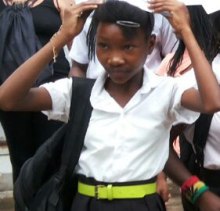
The police had information in advance of the street action that was going to take place, and even arrived before the activists at the scene, having demonstrated an excessive use of force in the face of a few dozens of people, mostly quite young, who were peacefully preparing their theatrical performance.
They threatened, pushed and used weapons and physical force to disperse the group, although not admitting to this fact. The police officers actually lied and misrepresent the events, claiming that the violence occurred against them, perpetrated by the five activists that were detained.
Before the press, the police was very interested in showing the presence of Caucasian and foreign activists, pointing out that it was a suspicious action, with the argument used many times, of the working of the “foreign hand”.
Also noteworthy the arbitrary confiscation of cell phones of people who were taking pictures, having deleted the same before returning the phones.
Throughout the process, the detained were not allowed to use phone inform their family members of their situation. If it were not for the presence of the activists outside the police station, they would not have had the means to contact anyone.
The defense of African culture as an excuse to remove rights
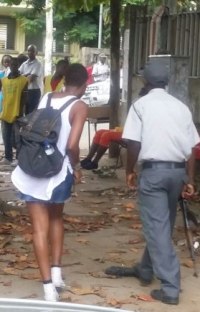
The incident of police violence that culminated with the arrest of five activists, on 18 March, Friday, brought to bear the prejudice against the equal rights of women and the stigma in relation to human rights activists. This is serious. Serious and revealing that Mozambique, which “sells” a facade of democracy and fairness, actually treats women and girls as categories to be tracked, and their bodies, as territories to be watched.
First of all, there was a police insistence to name white activists as those who led the street action. So much so, that two of those who were detained and handcuffed were white and foreign. Then, at the police station, they were presented to journalists as the “leaders” of the action.
In the Mozambican context, it is symptomatic the pretension to assign the role and claims the human rights of women and children to influences from abroad, trying to convey the message that we, Africans, lived happy and content before coming the West to impose their “ways of being”. It is that famous “foreign hand”, repeatedly invoked in recent years to disqualify demands and struggles for rights.
Confirming this, two of the detained activists, black, were called and asked “why they followed foreign women, who only wanted to destroy our culture”.
In addition, the behavior of the cops was insulting at all levels. One of the activists, aged 60, was told that she should be on a farm instead. The activists were treated as minors and incapable, to whom all personnel of the station saw fit to go deliver sermons.
There was also an excess use of force, from handcuffing the detained to the presence of military tanks and police dogs at the scene of the action.
This sad episode confirms what has been said for several years. The equality of women and the rights of women and children in Mozambique is still not a reality. People who claim rights do it through the exercise of their citizenship rights and are a valuable contribution to the deepening of democracy. Too bad one is if it’s the police who decides who may or may not make their voices heard.
And a last word. Children may be underage, but are citizens in their own right. And no one, not the parents, not the school, can remove the rights they are enshrined by the Constitution and by the entire Mozambican legislation.
The detained activists were being held incommunicado
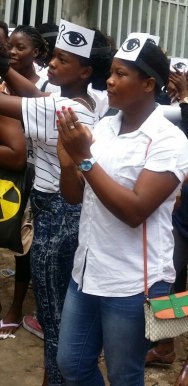
When the police detained the five activists before the beginning of the street action, the officers saw fit to handcuff them in order to transport the activist to the police station (7a esquadra). Some were rudely pushed into the police car.
At the police station, without raising any auto, the activists were closed in a single cell, and their cell phones, cameras, earrings, bracelets, and shoe laces were removed. The photos captured on cell phones were deleted.
When the inmates complained that they should be able to communicate with their families, they were denied that right. If it were not for the activists who gathered in front of the police station that sought to keep track of what was happening, and communicated what was going on with a lot of people, they would have been completely isolated, which seems that was the intention.
When the city prosecutor pointed out that the activists could not be held without the opening of an auto, the Commander of the police station refused to release them, saying that an auto would be swiftly produced.
The inmates were released around 5:30 p.m., after they registered their identification data.
Violence against the girl at school is a reality that nobody can deny
Adriana
When I was attending tenth grade, I was harassed by my History teacher. I shared what was going on with my Class Director, which in turn took the case to the School Board.
Then, the teacher in question was called in and received a warning which did not stop his assaults to show that he is in charge in their discipline, and he started to give me low grades so I would fail.
I am a very hard worker student and got good grades in all subjects except History, where I went to the exam with a low grade and failed. But, as the School Board and my Class Director knew what was happening, they did everything so I could write a supplementary exam, where I was supervised by other teachers and I was able to pass.
When it happened, I told my mom and she supported me a lot, she even came with me when I made the complaint to the school.
This sexual harassment, which did not materialize in a sexual assault, left deep scars on me and almost interfered with my dreams. I have always dreamt of studying international relations since childhood and to this day it still is my dream. However, there came a time when I was about to give up, because one of the exams to ingress on a degree on international relations is History and the other Portuguese and I was hating History because of my teacher.
My mom once again played an important role, so that I would continue with this dream, either advising me, either giving me support.
I suffered sexual harassment, but always dress the way I am today, I never wear short or tight clothes. This to say that sexual harassment, violence to children, teenage girls, young women, the elderly and adults suffering has nothing to do with clothes, but with the behaviors of some men, who, sadly, are the majority.
Maria
Last week felt sick and the teacher authorized that two of my colleagues take me home. However, that day he gave group work and when we went to the next class, we were looking for groups to join. Two of us managed and one of us did not.
In the next lesson, the teacher asked if we managed to join a group, and we said yes, but one of my classmates was not able to join a group, because she had accompanied me home. I did not know she had not managed to join a group.
Then the professor began to insult me, called me names and finally said he would take my name of the group work. He scratched out my name in front of me and then said that I had zero in the test because he forbade me to write it. I just kept quiet, I think I’ve failed. Just that day I received two punishments, because the previous class teacher also gave me noogies on my head, I’ve lost count, why did not the Board informed him that I would be in a training.
Helena
At school we have all kinds of teachers, good and bad, and the worst are the teachers of physical education, chemistry, biology, they beat us and say things that we as students don’t like.
When we go to the board and we have not been able to do the exercise correctly, when we can’t solve the homework or we lack any material, teachers use the eraser to beat us at the tip of the fingers, regardless of having nails and it hurts a lot.
Other teachers order us to hug them and then pinch us too hard. A colleague of ours, that only wore the uniform shirt without a blouse or shirt inside, even left wounded.
Other teachers, as punishment, pinch the breasts with great strength and we can’t cry.
Also to punish us, some teachers carry pens put them on our ears and start pinching us.
But the worst is the Physical Education teacher, which in addition to calling us big people, calls us, male and female genitals, using their own names, and when it is to punish us girls he tells us to spread our legs and beats us on our sexual organs.
This is in general.
Paula
The cut that caused this big scar on my face happened in 2014. When I joined eight grade I was placed to study at Polana High School, but in the night course. My brother did the registration and, on the first day of school, I went to school. When they finished school, around 22 hours, I went to the bus stop to get my transport home. There, three boys, I don’t know if they followed me, told me to hand over the phone and I replied that I did not have one. Then, they started to beat me and then they broke bottles and cut my face. I was saved by a gentleman who took me to the hospital and there I received treatment.
I spent that year without studying, last year also, just now you guys convinced me to come back and gave me support and I have managed to go back. Because I was and still am too afraid to go through the same violence. What to do?







 Information in English
Information in English